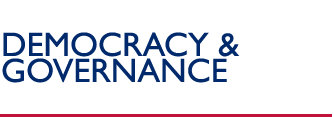Democracy and Governance in Madagascar
The Development Challenge: The Government of Madagascar (GOM), led by President Marc Ravalomanana, is engaged in an ambitious effort to address the country's immense development challenges. Stricken with widespread poverty and endemic corruption, Madagascar has an average per capita income of only $255; 70% of its population lives below the poverty line; 49% of children under five years of age are malnourished; rates of child mortality of 84 per 1,000 live births and maternal mortality of 488 per 100,000 live births are unacceptably high; life expectancy is only 55 years; HIV prevalence is 1.1%; the annual population growth rate is high at 2.8%; and, 46% of the population is illiterate. The projected 2004 real gross domestic product (GDP) growth rate of 5.3% is considerably less than the 9.6% growth rate achieved last year. Overall macroeconomic management has been sound, but the economy was buffeted by a rapid depreciation of the currency in early 2004 and rising world prices for rice and petroleum products, resulting in a projected inflation rate of 27%. In mid-2004, Madagascar reached the Completion Point under the Highly Indebted Poor Countries Initiative (HIPC), resulting in extensive cancellation of sovereign debt ($1.9 billion U.S. dollars). Based on sound economic, governance, and social investment indicators, Madagascar was selected as one of the first 16 countries worldwide eligible to receive Millennium Challenge Corporation (MCC) funding.
Under the country's Poverty Reduction Strategic Plan (PRSP), GOM development priorities emphasize good governance, economic growth, and social welfare. To promote good governance, the GOM has established an Anti-Corruption Commission in the Presidency as well as an independent, anti-corruption agency, both of which are supported by USAID's Anti-Corruption Initiative. The GOM requires public disclosure of assets by state officials and is introducing public finance and customs sector reforms. The government is working to reduce the illicit trade of precious and semi-precious gemstones. The GOM has canceled illegal forestry permits and has banned the export of endangered species. To stimulate economic growth, the GOM has strengthened partnerships with the private sector and, with donor support, will have invested over $1 billion in roads and other transportation infrastructure by 2006. The GOM also declared a two-year tax holiday on investment and limited consumer imports, and has opened the sale of land to foreign investors. Recognizing the importance of its unique environment to the long-term health of the Malagasy economy and the welfare of its people, and building upon support from USAID and other donors, the GOM has dramatically increased planned protected areas from 1.7 million to 6 million hectares. In the social sector, the GOM is committed to preventing the spread of HIV/AIDS; fighting malaria; strengthening health care at the community level; and increasing access to and the quality of primary education through its "Education for All" program.
Installed in 2002, the Ravalomanana government maintains considerable public support for its ambitious programs. However, it faces a number of risks: that a weak and poorly equipped bureaucracy will be unable to accomplish many of the planned reforms and results; that ambitious social programs will outstrip government revenues; that the public will grow impatient with the pace of reform under the weight of grinding poverty and rising food prices; that vested interests will retard the reform agenda; that foreign investment will fail to materialize at the rate necessary to meet economic growth objectives; and, that natural disasters -- the country is vulnerable to cyclones -- will undermine GOM progress. U.S. Government (USG) development assistance mitigates these risks.
U.S. national interests in Madagascar include the preservation of the country's unique biodiversity; its growing importance as a bilateral commercial partner under the African Growth and Opportunity Act (AGOA); and alleviation of its deep poverty, which is exacerbated by natural disasters, food insecurity and weak social services. The United States and Madagascar enjoy close relations, and Madagascar is an ally in the global fight against terrorism. The top three U.S. foreign policy objectives in Madagascar are promotion of democracy; broad-based economic development (including health); and environmental protection. Complementary interests include containing the nascent HIV/AIDS epidemic, supporting the country's democratic transition, and combating Trafficking in Persons. Madagascar is one of the three highest biodiversity conservation priority countries in the world.
The USAID Program: The overall goal of the USAID program in Madagascar is sustainable and inclusive economic development. Madagascar's acute poverty and legacy of corruption continue to pose formidable challenges to government and donor community efforts to transform the country. Human and financial resources and the institutional capacity to implement programs, especially in the public and nongovernmental organization (NGO) sectors, remain weak, undermining the overall ability of the Malagasy Government to deliver results. The USAID program directly addresses these problems by strengthening local NGOs and selected government institutions; promoting public-private dialogue; supporting the implementation of a national anti-corruption agenda; increasing access to quality health services and products; improving natural resource management; promoting private investment; and increasing rural incomes.
(Excerpted from the 2006 Congressional Budget Justification for Madagascar)
Back to Top ^
|


